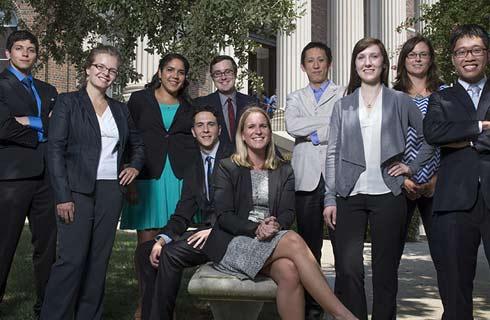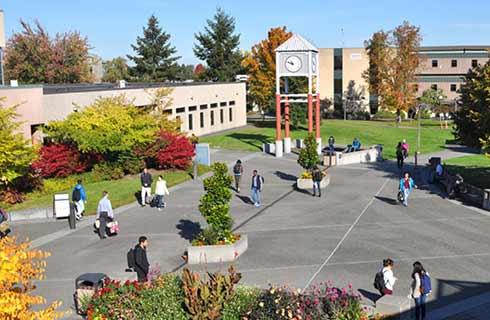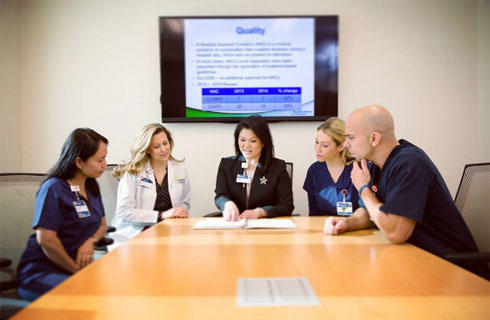环境系统工程理学学士
Bachelor of Science in Environmental Systems Engineering

学历文凭
Bachelor Degree

专业院系
College of Earth and Mineral Sciences

开学时间

课程时长

课程学费

国际学生入学条件
The majority of Penn State’s applications come from traditional, first-year students. The following types of students are considered first-year applicants (or freshman applicants, as some refer to them): Current high school student in his or her senior year; Student who has earned a high school diploma or a GED and has no post-secondary coursework; Student who has attempted 17 or fewer credits (semester hours) of college coursework at a regionally accredited college/university before attending Penn State; Current high school student who may have enrolled in another institution(s) before graduating from high school (dual enrollment); Student who may have attended Penn State on a nondegree basis.
English Language Proficiency
The following are ways in which you can satisfy the language proficiency requirement: TOEFL: A minimum TOEFL score of 80 on the Internet-based TOEFL or 550 on the old paper exam and a minimum of 20 in each section of the new paper exam (code #2660); IELTS: A minimum IELTS score of 6.5 on the academic test.
IDP—雅思考试联合主办方

雅思考试总分
6.5
- 雅思总分:6.5
- 托福网考总分:80
- 托福笔试总分:160
- 其他语言考试:Duolingo English Test (DET): A minimum score of 120 is required.
CRICOS代码:
申请截止日期: 请与IDP联系 以获取详细信息。
课程简介
It is an interdisciplinary program with two options. One option is Environmental Systems Engineering and it is concerned with the impact of industrial activities on the environment and the choice of cost-effective remediation strategies. The other option is Environmental Health and Safety Engineering and it is concerned with safe and healthful design of industrial systems such that workers are protected from potentially high-risk exposures associated with today's industries. The program is unique as it is designed to address critical environmental, safety and health problems of the basic industries such as those involved in the extraction, conversion, and utilization of energy and mineral resources. The courses are sequenced so that students acquire an appropriate blend of theory, applications, and design and are equipped with the fundamentals necessary to maintain lifelong professional growth. Graduates are prepared to enter both the private and public sectors as environmental systems engineers or health and safety engineers or to pursue further education at the graduate level.<br><br>During the first two years, the program shares many common features with other more traditional engineering disciplines. Students then take a series of special courses that introduce engineering concepts in the extractive and process industries. Process engineering and a variety of solid-solid, solid-fluid, and fluid-fluid separations play a major and often dominant role in the prevention andor remediation of environmental damage or the prevention of health and safety hazards resulting from industrial activity. Students then specialize in the particular problems associated with air, land, or water; environmental health and safety engineering; or select a hybrid program. Specialization is accomplished through a combination of additional designated courses and selection from an extensive list of relevant elective courses. The curriculum is structured so as to integrate design concepts into the various subject areas covered in the program.
相关申请
 预科
预科 奖学金
奖学金 实习机会
实习机会 在校学习
在校学习 跨境学习
跨境学习 校园授课-线上开始
校园授课-线上开始 在线/远程学习
在线/远程学习
开学时间&学费
学费信息仅供参考,请与IDP联系以获取详细信息
| 开学时间 | 时长 | 学费 | 地点 |
|---|
学校排名

世界排名78
数据源:
泰晤士高等教育世界大学排名
关于宾州州立大学帕克分校

每122位本科毕业的美国人中就有1个是PSU的校友1855年建校的宾州州立大学目前已经有了24个校区,University Park是其中的旗舰校区,也是规模最大的校区,容纳学生45000余人。距离宾州州府Harrisburg仅仅17英里的地理位置优势让University Park成为最受欢迎的PSU校区,同时也成为了录取率最低的校区。Party School的称号在PSU身上由来已久,但同时,每年专程跑到PSU校内面试应届毕业生的公司和政府部门超过1000个,这里的学术水准绝对不是盖的。美国每50个工程师中,就有1人是PSU的毕业生PSU的理工课尤其是工程学专业非常知名。实际上从1988年开始,PSU从工业界拿到的学术研究资金总额一直排名美国所有大学的前两位,仅次于麻省理工。很多工业界企业干脆直接将产品研发放在PSU进行。另外,地球与矿产科学学院在美国同类学院中排名第6,其中的地理专业全美第一,地质专业全美第三,均属世界一流学科项目。理论性大众传媒专业同样排名全美第一,与哥伦比亚大学的应用型大众传媒并驾齐驱。 Penn State-University Park的申请竞争相当激烈。申请材料中主观性的PS与简历部分属于非要求项。实际上,每年,单纯从成绩角度做出的录取决定占总录取人数的2/3。所以,想去PSU,得先保证有一个靠谱的标准化成绩。
本校相关课程
其他相关课程

环境工程应用科学学士学位
 滑铁卢大学
滑铁卢大学学历文凭
Bachelor Degree
开学日期
课程费用总额


环境工程应用科学硕士
 达尔豪斯大学
达尔豪斯大学学历文凭
Masters Degree
开学日期
课程费用总额


环境工程学硕士
 达尔豪斯大学
达尔豪斯大学学历文凭
Masters Degree
开学日期
课程费用总额


环境工程技术文凭
 萨省理工学院
萨省理工学院学历文凭
Bachelor Degree
开学日期
课程费用总额


替代能源技术文凭
 北阿尔伯塔理工学院
北阿尔伯塔理工学院学历文凭
Bachelor Degree
开学日期
课程费用总额


环境工程学硕士
 渥太华大学
渥太华大学泰晤士高等教育世界大学排名:188
学历文凭
Masters Degree
开学日期
课程费用总额










 美国
美国





